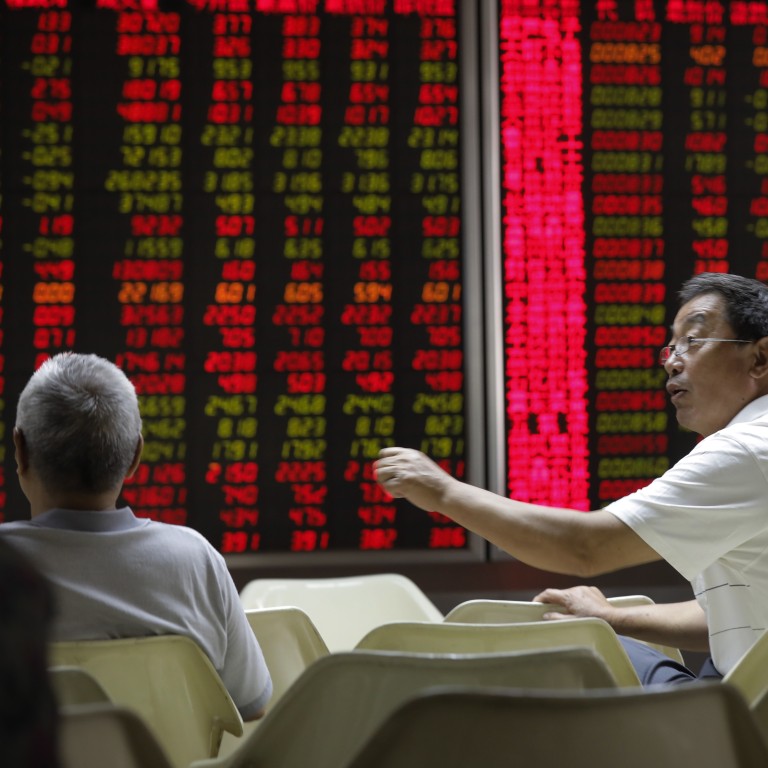
Hong Kong, China stocks end higher as political tensions over extradition bill subside
- Conclusion of US Fed’s meeting on Wednesday could be a pivotal moment for markets as investors await clearer signals on interest rate cut
- The first public appearance by Hong Kong’s chief since a historic march of as many as 2 million people on Sunday may calm tensions
Hong Kong and China stocks rose on Tuesday, as investors remained cautiously optimistic ahead of a US Federal Reserve policy meeting and amid cooling political tensions over a controversial legislation in the city.
The Hang Seng Index climbed 1 per cent to 27,498.77 by close, breaching the 20-day moving average of 27,258.74, which is seen by technical analysts as a key resistance level. Turnover stood at HK$71 billion, below the daily average of HK$97 billion in May.
The Shanghai Composite Index added 0.1 per cent, or 2.54 points, to 2,890.16. The Shenzhen Component Index rose 0.3 per cent, and the ChiNext Index of small companies gained 0.9 per cent.
Turnover in Shenzhen and Shanghai was 321.7 billion yuan (US$46 billion), the lowest level in four months.
Investors “are waiting for clearer skies,” said Louis Tse Ming-kwong, managing director of VC Asset Management. “It’s a ‘wait and see’ game.”
The US Federal Reserve’s policy meeting to conclude on Wednesday could be a pivotal moment for markets, as investors are eager to search for clearer signals on the possibility of interest rate cuts from chairman Jerome Powell’s remarks.
“If market expectations for cuts are not met, we could see a jump in market volatility,” César Pérez Ruiz, head of investments and chief investment officer at Swiss private bank Pictet Wealth Management, wrote in a note.
The market has largely priced in two rate cuts for the year – with the first in July. But Pictet expects the first Fed rate cut to come no earlier than September, unless US-China trade talks “completely derail”.
Meanwhile, traders gauged potential directions of Hong Kong’s recent political unrest ahead of a press conference by Hong Kong’s chief executive Carrie Lam Cheng Yuet-ngor in the late afternoon, as the city’s market was closing. An estimated two million people took to the streets on Sunday to call for the withdrawal of a controversial bill that would allow extradition to mainland China.
Blue chip stocks led the advance. Hong Kong Exchanges and Clearing rose 2.7 per cent to HK$271, as recent media reports of a planned IPO by Chinese internet giant Alibaba Group in Hong Kong – which owns the South China Morning Post – prompted expectations of better earnings for the bourse operator.
Internet and entertainment giant Tencent Holdings rose 1.6 per cent to HK$334.2, after the Shanghai government released new guidelines to promote the city’s status as the “world’s e-sports capital”, signalling support for online gaming.
Property developers also rose on speculation of a greater likelihood of interest rate cuts by the US Federal Reserve this year, which would lead to lower rates in Hong Kong to benefit property transactions. Sun Hung Kai Properties advanced 2.5 per cent, and Henderson Land gained 0.7 per cent.
Rice cracker and flavoured milk maker Want Want China Holdings gained 1.7 per cent to HK$5.87, after reporting better-than-expected net profit for the financial year ended on March 31.
China Tobacco International (HK), the international unit of a state-run tobacco monopoly, surged by 17 per cent, extending a powerful rally of nearly 70 per cent from its initial public offering on last Wednesday.
The company, which trades tobacco leaf and sells China-made cigarettes to overseas markets, raised HK$735 million its IPO last week. The retail tranche of the offering was oversubscribed by 102 times.
Investors piled into the stock based on the solid foundation of its parent company’s business – China has over 300 million smokers. Many also jumped in on rumours that the company could soon be included in a list of stocks that mainland Chinese investors can trade through the Stock Connect programme.

